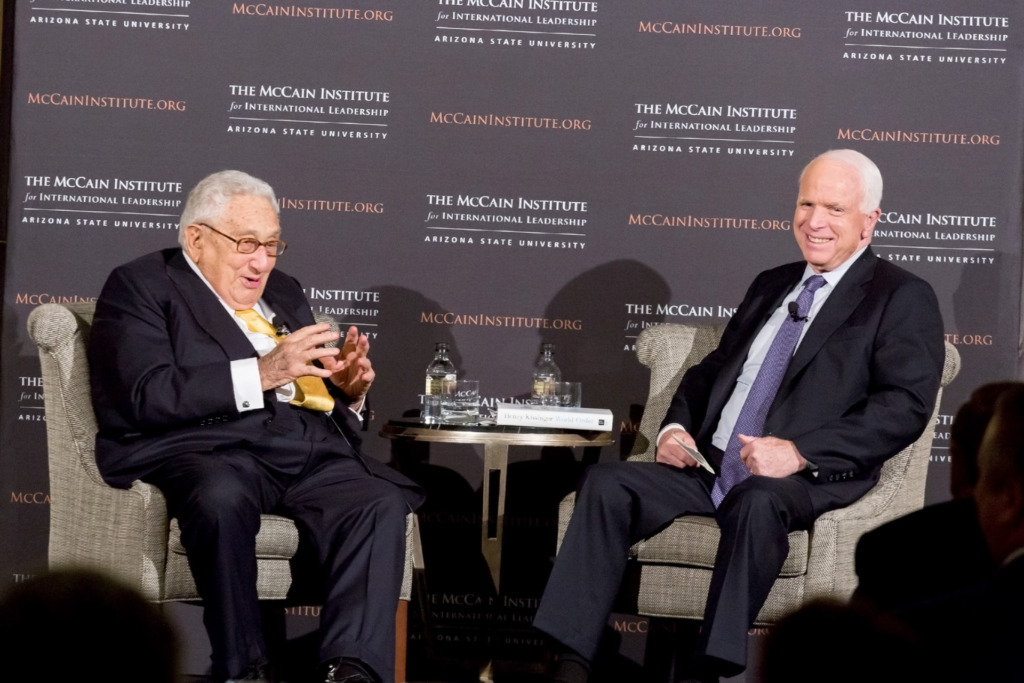
Watch Dr. Kissinger’s 2018 eulogy for Senator McCain HERE.
WASHINGTON, D.C. – McCain Institute Executive Director Dr. Evelyn Farkas today issued the following statement upon the passing of former U.S. Secretary of State and National Security Advisor Dr. Henry Kissinger:
“Dr. Henry Kissinger was an American statesman like no other. Born in Weimar Germany, he and his family fled Nazi tyranny, beginning a new life in America where he rose from a teenage immigrant to the nation’s preeminent voice on foreign policy and a senior counselor to Presidents Nixon and Ford. Dr. Kissinger leaves behind volumes of writing that will help inform historians and theorists for centuries to come, and a legacy as a soldier, a statesman, and citizen that will remain a subject of historical interest. He was a mentor and informal counsel to Senator John McCain for decades, beginning in 1973 following McCain’s release from captivity in Vietnam. Following his release, McCain thanked then-National Security Advisor Kissinger for saving his honor after Dr. Kissinger insisted McCain not receive special treatment and an early release that would have been viewed as favoritism.
“We are extremely proud to house Dr. Kissinger’s namesake fellowship under the McCain Institute banner. With Dr. Kissinger’s support, the Kissinger Fellowship seeks to identify and empower seasoned national security and foreign policy leaders to dive deeply into strategic thought and the instruments of statecraft to develop their own skills in providing foreign policy leadership and advance projects in the field.
“The world will sorely miss Dr. Kissinger’s insights and diplomacy. Our thoughts are with his wife Nancy, his family, and loved ones.”
A Unique Friendship: Dr. Henry Kissinger and Senator John McCain
Dr. Henry Kissinger and Senator John McCain met for the first time on May 24, 1973, at the homecoming dinner President Richard Nixon hosted at the White House for the prisoners of war just returned from Vietnam. They had almost met three months earlier.
The Paris Peace Accords ending the war in Vietnam were signed in January 1973. The following month, President Nixon sent his National Security Advisor, Dr. Kissinger, to Hanoi to negotiate the treaty’s implementation with the North Vietnamese government. Vietnamese Prime Minister Pham Van Dong hosted a dinner for him on February 12.
At the time, Navy Lieutenant Commander John McCain III was in his sixth year of captivity and was being held in Ho Lao prison, nicknamed the Hanoi Hilton by the American POWs, which was located only a few blocks from where Pham and Kissinger were having dinner.
The North Vietnamese had agreed to the repatriation of all American POWs as a condition for the withdrawal of U.S. forces in Vietnam. They were scheduled to be released in three groups according to the dates of their capture, with the longest-held POWs released first. The order of returns is governed by military code of conduct and is a matter of pride and honor to POWs.
In the summer of 1968, after his father, Admiral John S. McCain Jr., had been appointed Commander in Chief of U.S. forces in the Pacific, LCDR McCain’s captors offered to release him. Although he was in poor physical condition at the time and held in solitary confinement, he refused to go home ahead of men who had been captured before him. The Vietnamese insisted he do so on repeated occasions, but he continued to refuse. In August, he was subjected to severe and prolonged torture, and forced to sign a “confession.”
The treatment of the POWs had improved somewhat since then, and their morale was good. Since the Christmas bombing two months earlier, they had been convinced they would soon be going home. Senator McCain recalled his state of mind in the last month of his captivity.
“For several years, I had struggled to preserve my honor in a situation where it was severely tested. The longer you struggle to hold on to something the more you come to cherish it. And after a while, my honor, which in that situation was entirely invested in my relations and the reputation I had with my fellow POWs, became not just my cherished possession. It was my only possession. I had nothing else left.”
Near the end of their dinner, Pham told Dr. Kissinger he could take LCDR McCain home with him the next day. “Commander McCain will return in the same order as the others,” he told Pham. He knew McCain’s early release would be seen as favoritism to his father and a violation of the POW’s code of conduct.
Senator McCain was released in order with the second group of POWs on March 14, 1973. When he met Dr. Kissinger at the White House dinner, he thanked him “for saving my honor.”
The two men remained friends throughout their lifetimes, and Senator McCain relied on Dr. Kissinger’s brilliant strategic mind and wise counsel.
In a toast to Dr. Kissinger on the occasion of his 90th birthday, Senator McCain said this about his friend:
“So, here’s to my friend and benefactor, Henry Kissinger, the classical realist who did so much to make the world safer for his country’s interests, and by so doing safer for the ideals that are its pride and purpose. And who, out of his sense of duty and honor, once saved a man he had never met.”
About the McCain Institute Kissinger Fellowship
The McCain Institute Kissinger Fellowship supports a senior leader in foreign policy and national security, enabling real-world change and honoring Dr. Henry Kissinger’s lifetime of service. Japan’s Minister of Digital Transformation Kono Taro currently serves as the McCain Institute’s honorary Kissinger Fellow. Learn more HERE.